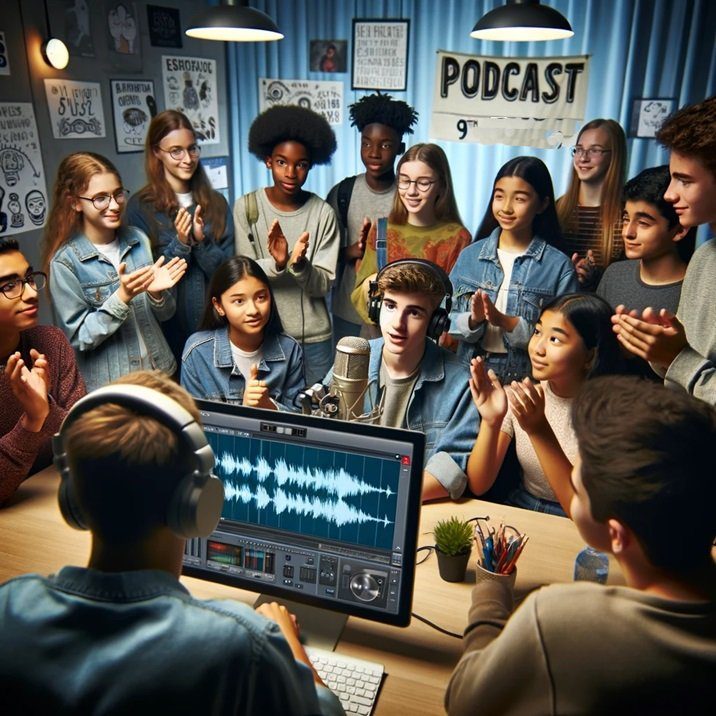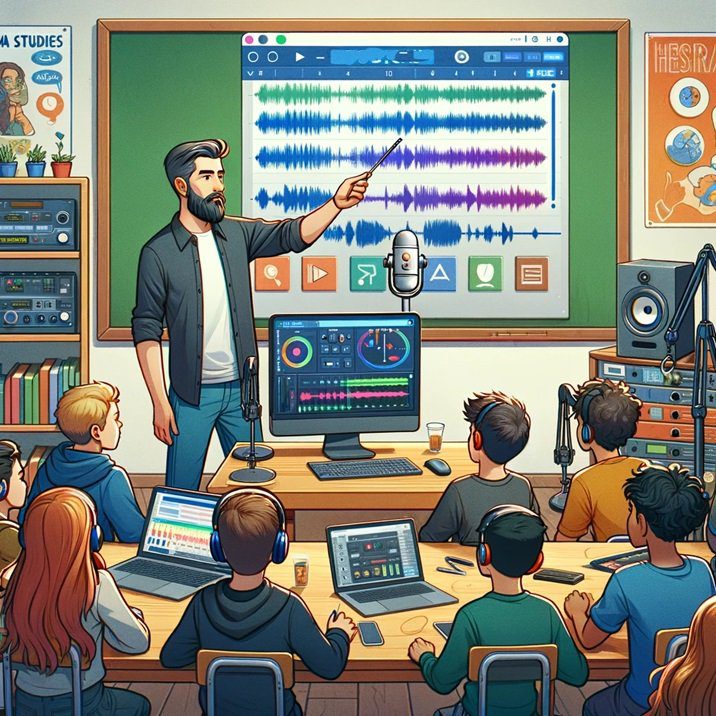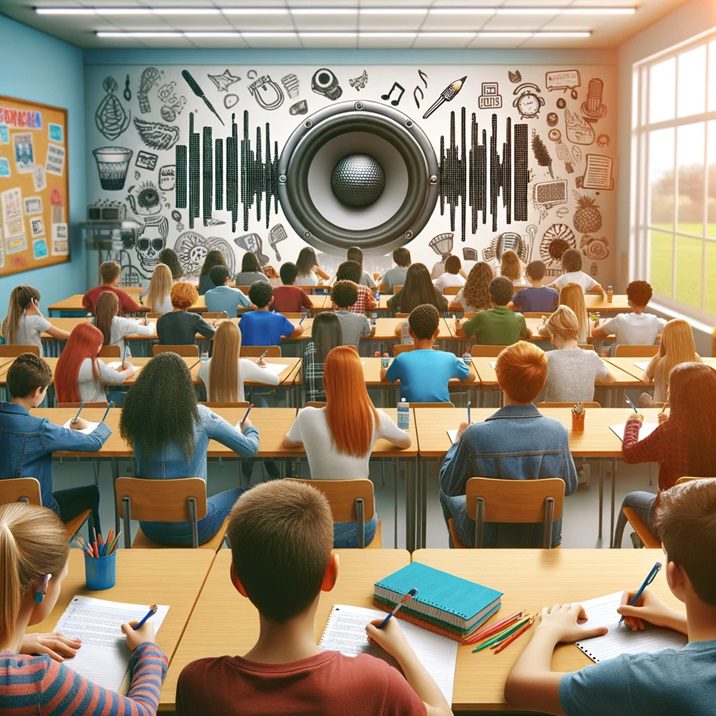Blubrry offers a 50% discount to all verified college students. This discount aims to lower the barriers for aspiring podcasters, making it easier to share their voices, stories, and knowledge with the world. Check out our Student Discount page.
Podcasting in education provides extensive value as an informational tool and production platform. Whether it’s teaching a course on podcasting and its best practices, students taking it upon themselves to learn the medium, or instructors using their podcast to disseminate lectures, podcasting offers vast opportunities among K-12 and college learners.
Student Podcasting
 Podcasting offers a unique and engaging way for students of all ages to explore their interests outside the confines of traditional classroom learning. It empowers students to delve into subjects they are genuinely curious about, which may not be covered in their standard curriculum.
Podcasting offers a unique and engaging way for students of all ages to explore their interests outside the confines of traditional classroom learning. It empowers students to delve into subjects they are genuinely curious about, which may not be covered in their standard curriculum.
This self-directed learning fosters a sense of autonomy and motivation, as students are not bound by prescribed textbooks or syllabi, but rather can follow their intellectual curiosities.
Podcasting as a hobby, interest, or even for extra credit can significantly enhance a student’s communication and technical skills. Creating a podcast involves a range of abilities, from researching topics and writing scripts to recording and editing audio.
Engaging in this process allows students to develop important skills such as critical thinking, organization, and attention to detail. Learning to use various software and equipment for recording and editing can boost their technical proficiency, a valuable asset in our increasingly digital world. As students create and share their podcasts, they also hone their public speaking and storytelling skills, which are crucial for personal and professional success.
For students, podcasting can also serve as a platform for self-expression and building a community. It allows them to share their voices, opinions, and experiences with a wider audience, fostering a sense of connection and belonging.
Through podcasting, students can find and engage with others who share similar interests, leading to the formation of communities where ideas and experiences are exchanged. This aspect of podcasting is particularly empowering, as it gives young people a sense of agency and influence, making them active participants in dialogues and discussions that matter to them. Additionally, for those who might be more introverted or less comfortable in social settings, podcasting offers a less intimidating way to express themselves and connect with others.
Podcasting can also be a valuable tool for personal growth and self-reflection. The process of creating a podcast encourages students to set goals, manage projects, and reflect on their path to learning. As they research topics and articulate their thoughts, students engage in deeper learning, enhancing their understanding and retention of information.
Furthermore, listening to a wide range of podcasts exposes them to diverse perspectives and ideas, broadening their worldview and fostering empathy and understanding. This exploration can be particularly impactful during formative years, as students develop their identities and understanding of the world around them.
Teaching the Art of Podcasting
 With the podcast industry turning 20 years old – and being a popular medium for nearly a whole generation – it stands to reason that teaching a course on how to podcast is filtering into the educational system.
With the podcast industry turning 20 years old – and being a popular medium for nearly a whole generation – it stands to reason that teaching a course on how to podcast is filtering into the educational system.
By tapping into experiential learning, podcasting has become a compelling medium, bolstering traditional teaching methods with compelling and engaging content.
Creating podcasts in the classroom is a proficient way of injecting interactive and dynamic content into the curriculum.
This process encourages student participation and boosts cognitive learning. Podcasts function as valuable learning resources for pupils, who can listen to them at their own pace, fostering self-paced learning and enhancing comprehension. This approach allows teachers to document student progress, providing critical insights into the effectiveness of the current teaching methodologies.
Looking at podcast activities for students and podcast assignment examples, it’s easy to discern the potential benefits of this medium. Podcast activities can range from curating informative episodes on course topics to brainstorming sessions, stimulating creative thinking and problem-solving skills.
Assignments can be utilized as an assessment tool. In addition to creating their podcasts, students might be asked to review or critique a series of podcasts to demonstrate their understanding of the subject matter.
Adopting student podcast projects is a powerful method of diversifying the learning experience, ultimately improving retention rates. This hands-on approach promotes several soft skills, such as communication, critical thinking, teamwork, and technical proficiency among students.
By allowing learners to repackage course content into engaging episodes, podcasts become a portal for students to express themselves creatively while demonstrating their academic abilities.
Podcasting for Instructors
 There are profound benefits of podcasting in education. Podcasting provides an opportunity for personalized learning as it caters to various learning styles – auditory learners can benefit significantly from the medium.
There are profound benefits of podcasting in education. Podcasting provides an opportunity for personalized learning as it caters to various learning styles – auditory learners can benefit significantly from the medium.
Its flexibility and convenience allow learners to access educational content on demand, regardless of their location, thereby expanding the spatial boundaries of classroom learning.
Podcasting as a teaching tool presents several notable advantages for educators working with students from kindergarten through higher education. Podcasts offer an accessible and flexible learning format. Unlike traditional classroom settings, podcasts allow students to engage with course material at their own pace, in a variety of settings.
This flexibility is especially beneficial for diverse learning styles and needs, as students can pause, rewind, and replay the content as many times as necessary to fully grasp the concepts. Additionally, for students who may have scheduling conflicts or who are unable to attend classes due to illness or other reasons, podcasts ensure they don’t miss out on valuable lessons.
Podcasting enriches the learning experience by incorporating a variety of educational resources and perspectives. Educators can include interviews with experts, discussions with other teachers or students, and audio clips from relevant sources, providing a richer and more diverse learning experience than a standard textbook or lecture might offer.
This multidimensional approach can stimulate interest and engagement among students, making learning more enjoyable and effective. For subjects that benefit from auditory learning, like language studies or music, podcasts can be particularly advantageous, offering an immersive and interactive experience.
The use of podcasting in education also aligns well with contemporary digital literacy skills that are essential in today’s technology-driven world. By integrating podcasts into their teaching methods, educators are not only providing content but also teaching students how to access, evaluate, and use digital information effectively. This aspect of podcasting prepares students for higher education and the workforce, where digital competency is increasingly crucial.
Teachers can easily update or expand their podcast series to include new information, align with current events, or adapt to curriculum changes. This flexibility ensures that the educational content remains relevant and up-to-date.
In education, where research and theories can rapidly evolve, this ability to swiftly update and disseminate information is invaluable. Additionally, well-crafted educational podcasts can be shared across different schools, districts, or even globally, enabling educators to reach a broader audience and have a greater impact on the educational community.
Podcasting in Education Topics
Podcasting, as an evolving facet of modern-day education, is transforming the way information is conveyed and absorbed in academia. Powerfully integrating technology with education, podcasting breaks away from the traditional learning mode, enabling students to access education anywhere, anytime.
More than just an educational tool, podcasts facilitate diverse topics with creativity and adaptability. Podcasting in education topics encompasses a broad spectrum of learning styles and preferences.
It can accommodate auditory learners who absorb information best through listening, visual learners through video podcasts, graphic podcast covers and supporting materials, and kinesthetic learners who prefer to learn while doing other activities.
Some topics worth considering include:
- Historical Figures and Events — Deep dives into the lives of significant historical figures or detailed examinations of key events in history.
- Scientific Discoveries and Innovations — Explorations of major scientific breakthroughs, discussing both the science and the impact on society.
- Mathematical Concepts Explained — Simplifying complex mathematical theories and problems for a broader understanding.
- Literature Analysis – Discussions and analyses of classic and contemporary literature, exploring themes, characters, and author backgrounds.
- Environmental Studies and Sustainability — Covering topics on environmental science, climate change, and sustainable living practices.
- World Cultures and Languages — Introducing various cultures around the world, including language basics, customs, and traditions.
- Art History and Criticism — Exploring different art movements, famous works of art, and the lives of renowned artists.
- Music Appreciation and Theory — Discuss various music genres, theory, and the history of music, including interviews with musicians and composers.
- Health and Wellness — Focusing on physical and mental health topics, nutrition, exercise, and overall wellness strategies.
- Technology and Innovation — Examining the latest technological advancements, their applications, and implications for the future.
These topics can be tailored to fit different age groups and learning levels, making them versatile tools in an educational setting.
Blubrry, in supporting educators and educational opportunities, offers services to create and distribute podcasts across a myriad of topics and fosters valuable learning experiences.
Encouraging growth and promoting community, these podcasts amplify diverse voices while making education more accessible and engaging.
The integration of podcasting into educational practices offers a multitude of benefits for teachers and students across all levels of education. Its flexibility, richness in content, alignment with digital literacy skills, and scalability make it an effective and modern tool for enhancing the educational experience.
When considering podcasting in education, it’s important to partner with a podcast company that understands the intricacies and difficulties that arise in the medium.
On the technical front, issues of access to appropriate equipment for creating and listening to podcasts are common, leading to discrepancies in how students interface with the material. Additionally, some students may need help with self-directed learning if they’re accustomed to more conventional teaching methods.
These possible obstacles necessitate careful consideration when deploying podcasts in an educational setting. Blubrry’s Concierge Onboarding service can bypass some of the challenges of starting a podcast, and allow educators to launch directly into recording and publishing their shows. Also, Blubrry’s highly respected support team is easily accessible and responsive.
The potential benefits of implementing podcasting in education for students, teachers, and institutions are astounding. As we look toward the future, platforms like Blubrry Podcasting offer a tantalizing glimpse at the mixed-media world of tomorrow’s education, where learning is intriguing and accessible.




